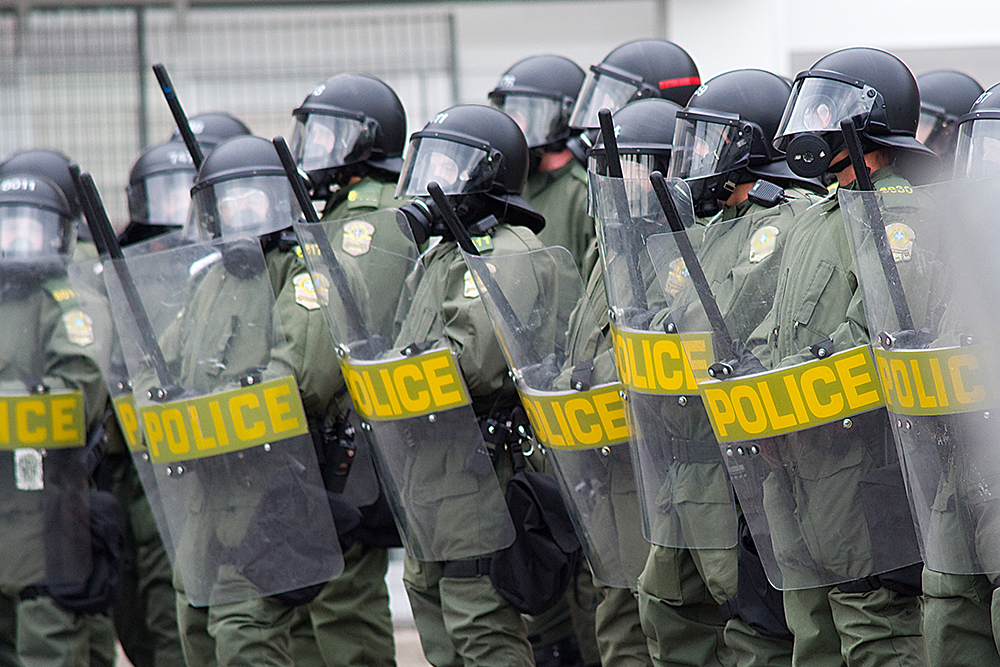

Features
Employee Activism
Legal
Off-Duty Conduct
Workplace Violence
Tips for employers if political extremism creeps into Canada
January 14, 2021
By
Marcel Vander Wier
 Photo: mario beauregard/Adobe Stock
Photo: mario beauregard/Adobe Stock Last week’s events at the U.S. Capitol made shockwaves around the world.
Onlookers looked on in horror as protesters smashed windows, scaled walls and mobbed the meeting place of the U.S. Congress as lawmakers were gathering to confirm the Electoral College results and President-elect Joe Biden’s victory.
Smaller protests also took place in Canada on Jan. 6, while south of the border, the FBI warned of more insurrection to come.
The violent outbursts from citizens provided lessons for employers, said Lew Bayer, a civility expert in Winnipeg.
“This type of behaviour doesn’t just happen overnight,” she said. “Mistrust and frustration and anger (were) surely brewing for a long time. It would seem that leadership was simply not paying attention — or observing, but not really listening.”
Defusing conflict
The best way for organizations to avoid incivil conduct in workplaces is to address it before it begins, according to Bayer.
Setting best practice, policy and procedures in place before high-stress situations arise “sets expectations and builds trust,” she said.
“Incivility is clearly rampant when leadership (and others) are lacking in respect, restraint and responsibility.”
With a standard in place where workers are treated well, “people become conditioned to trusting employers and leadership, and they meet expectations for how to treat others,” said Bayer. “Then when crisis happens, there is already trust and so things don’t go off the rails as much, or things at least bounce back to civil quicker.”
When difficult conversations or conflict do arise, it’s important to take a breath, she said.
“It is critical to pause, to consider the root and rationale for the disagreement from all sides, to suspend judgment, listen, and then to determine an end in mind that all parties can live with.”
If violence was to occur, it would likely stem from a “lack of learning, inability to think from a systems point of view, and self-indulgence versus personal accountability,” Bayer added.
Legal options
Canadians have been paying attention to America’s volatile political situation, and many employers are wondering what legal recourse opportunities may be available if similar events transpired here, said Laura Williams, principal of Williams HR Law in Markham, Ont.
Discipline, or just cause dismissal, can be justified in circumstances where an employee’s off-duty conduct has a sufficient impact on the employer’s reputation — or creates a genuine difficulty in the employee’s ability to continue to perform their work for the employer, she said.
However, just cause for dismissal is a very high threshold in Canada, said Williams.
“Just cause terminations have been dubbed by Canada’s highest court as the ‘capital punishment’ of employment law,” she said. “Accordingly, employers must carefully consider all of the circumstances and afford alleged wrongdoers a full and fair opportunity to provide their side of the story.”
Typically, an investigation is needed before a just cause dismissal can be justified.
Otherwise employers risk being hit with costly claims for wrongful dismissal and potential additional damages, said Williams.
“Whether the off-duty conduct rises to justify discipline or just cause dismissal depends on the circumstances and the severity of the off-duty misconduct,” she said.
Employers should consider the pre-emptive step of setting expectations when it comes to off-duty behaviour that may have an impact on the employer’s reputation. A code of conduct is an excellent opportunity for this to be communicated.
“When implementing new codes of conduct, employers however should be very careful in drafting the language, as such policies can have impacts on other aspects of employment — including an employee’s termination entitlements — that could increase an employer’s liabilities,” said Williams.
Explaining reputational risks to organizations as a result of social media usage and content should be included, she said.
Dismissal without cause
Provincially regulated employers have the option to dismiss employees without cause in the event that they feel that the employee is no longer a good fit for the role, Williams noted.
In most provinces, employers are free to dismiss an employee without cause at any time so long as the termination is not related to a prohibited ground under human rights legislation, she said.
“Political activity and affiliation is not a protected ground under human rights legislation,” said Williams. “As such, an employee would not be able to dispute a without-cause termination on the basis that the termination was related to an affiliation with a particular political organization.”
Termination without cause gives rise to the employee’s termination entitlements; however, the employer may be willing to bear the cost of dismissal where an employer feels that the separation is in the organization’s best interests, including those related to its reputation.
Print this page